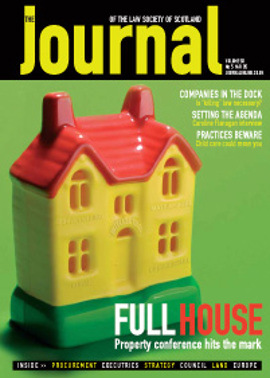The JAB: why it isn't working

An American President famously remarked that he had only made three mistakes during his tenure of office, two of which were presently sitting on the Supreme Court bench. Surely such mistakes are a thing of the past for Scotland with its Judicial Appointments Board?
I am fortunate in my job to be able to meet many members of the legal profession, including high-ranking judges. I am also lucky to be able to have “full and frank” discussions with them. I know that there is widespread disquiet, from the top of the profession down, about many of the Board’s selections. I am not telling anyone involved in court work anything they do not know already.
While the Board has made a number of excellent and well deserved appointments, in some cases people of less than average legal ability have been made sheriffs. People who struggle to make a living in the profession have been elevated. These appointments devalue judicial office. Respect for the bench is essential for professional and public confidence in the system. The more questionable appointments made, the more confidence will be eroded.
Like many others, I welcomed the creation of the Board to replace the system of the Lord Advocate nominating judges and sheriffs. No matter how honestly the Lord Advocate of the day discharged his duty, there was a danger that the profession and the public viewed the power as being exercised on a “grace and favour” basis. Indeed, from time to time, political allegiances appeared more important than legal ability. Surely the new system had to be better?
From a constitutional perspective (albeit not yet on a legislative basis), the Board is a much sounder vehicle. But any organisation will only function properly if it is made up of correctly qualified, honourable folk who apply proper processes. As set up, the Board is composed equally of legal and lay persons (those who are not practising lawyers). The Board and its interviewing panels are each chaired by a lay person. Now, with the best will in the world, what possible value can lay people add to the selection task? They may bring a variety of skills to any table at which they are asked to sit. But how can they know who will be a good judge and who will not? They cannot, and it is no good pretending otherwise.
I would not go to a surgeon who was appointed by a board made up of some doctors and local community councillors, or a builder selected by the local women’s rural institute and a panel of builders. I would want the experts’ expert – anyone would.
The Executive has given the Board a long list of criteria to apply in recommending candidates. But I believe it is axiomatic that those who do not practise in the courts cannot possibly make intelligent, informed selection decisions. Applying this test, most Scottish solicitors (and advocates) are not able to make the difficult choices which are the essence of the Board’s work. Only those with direct working knowledge of the candidate, preferably over a long time, can properly determine that individual’s suitability for judicial office.
So, looking at its reports, it is surprising to discover that the Board has set its face against taking soundings on applicants from those in a position to know something of their abilities, personalities and people skills. This is the very process which would inform members and assist them in making wise decisions. However, the Board refuses to tread this path and insists, like the statue of Justice herself, on being blind. The Board even prohibits those of its members who have personal knowledge of a candidate from sharing that with co-members. As a result, judicial appointments in Scotland are not made on the basis of the best information available.
The Board’s justification for these practices is that they ensure openness, transparency and equality of opportunity for candidates. But do such qualities have to be achieved at the price of a self-induced state of ignorance?
Under the current procedure of the Board, a great deal depends on the contents of the application form submitted. As any HR professional will tell you, a good application form shows little more than an ability to fill in application forms. It certainly does not determine someone’s suitability to hold judicial office.
So what is the remedy? When the present appointments of Board members expire (perhaps when the Board is put on a statutory footing), the Scottish Ministers should have the courage to review the value of having a Board comprising 50% lay membership. If some lay input is required, it must be a small minority. On process, the Board has to proceed on the best evidence available and this requires taking soundings from knowledgeable third parties. For good reason, the best evidence rule has been an important part of Scots law for ages. Scottish Ministers should apply it to the Judicial Appointments Board.
In this issue
- Leaving on a high
- The JAB: why it isn't working
- One house, many rooms
- Bad company
- Tender and true
- Beware the pitfalls
- Alien investors in the US
- Budgeting and beyond
- Let's play tag
- Same old story
- Getting the message across
- Council life
- Should the party pay?
- Unintended effects?
- A fine Profile
- Public benefit?
- The appeal of leave
- When is a cost not an expense?
- Website reviews
- Book reviews
- What a waste!
- How safe are your titles?






